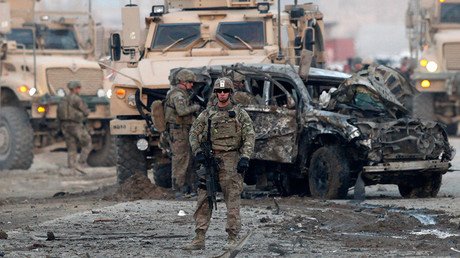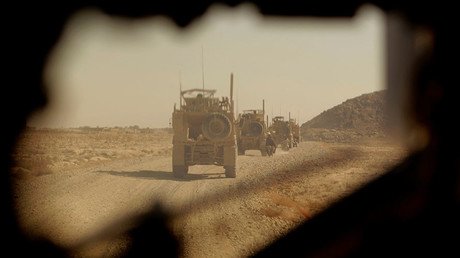‘Long-haul’ Afghan war to turn into ‘generational struggle’ involving US troops – Petraeus
Americans may stay on Afghan soil for a “long-haul” mission that could evolve into several decades of “generational struggle,” General David Petraeus, ex-commander of US troops in Afghanistan, admitted.
The current war in Afghanistan is unlikely to end in the foreseeable future, David Petraeus, who led the US military campaign there back in the 2000s, told PBS News Hour.
Though the retired General argued that “we went there for a reason and we stayed for a reason,” to defeat Al-Qaeda following the 9/11 attacks, he hinted that “a generational struggle” may unfold in the war-ravaged country.
“This is not something that is going to be won in a few years. We’re not going to take a hill, plant a flag, go home to a victory parade,” he said. “And we need to be there for the long haul, but in a way, that is, again, sustainable,” he added.
To back his remarkable statement, he cited other examples of US deployments in other parts of the world that have lasted decades.
“We have been in Korea for 65-plus years because there is an important national interest for that,” Petraeus said.
However, Petraeus “doesn’t think the US involvement will last that long” in Afghanistan.
The general argued “I think we should not approach this as a year-on-year mission,” noting that this kind of tentativeness gives Afghan leaders “the jitters.”
The interview was released as media reports have emerged indicating that the Trump administration is preparing to deploy an additional 4,000 troops in Afghanistan to train the nation’s army and battle the resurging Taliban. The figure, though sizeable, nonetheless pales compared to the previous number of troops stationed in Afghanistan, which reached 100,000 at peak times.
Petraeus, who commanded the US troops and NATO’s International Security Assistance Force (ISAF) from 2010 to 2011, insisted “it did actually turn back the Taliban.”
However, he then took a more measured tone, saying, “as I said, we are not going to permanently win this.”
The general maintained that there was “a huge difference between Afghanistan and even Iraq when we did the surge there.” Islamist groups like the Taliban, the Haqqani Network, and others are out of the reach of US forces, as “they’re in sanctuaries inside Pakistan,” he explained.
General Petraeus’ interview went on air just a day after the owner of a small brick factory and two of his sons were reportedly killed by US troops that indiscriminately opened fire after hitting an IED in Afghanistan’s southern Nangarhar province on Monday.
While US command said the soldiers were defending themselves, local residents told RT that they want the troops involved to be prosecuted.
Commenting on US operations in the Middle East and other regions, Petraeus said “there’s no question that there will be more of these,” though the military must try to minimize civilian casualties at all times. He admitted, however, that “this does happen in wartime.”
General Petraeus quit the military following a scandalous affair involving Paula Broadwell back in 2012, but his take on the situation in Afghanistan appears to reflect that of the current US secretary of defense.
Speaking at a Senate Armed Services Committee hearing on Thursday, Jim Mattis acknowledged the US is far from declaring victory over the re-emerging Taliban and presently has no viable strategy for the Afghan war.
However, that the Pentagon is determined to come up with one soon, he assured the committee, promising that Congress should expect it “very shortly.”
“We are not winning in Afghanistan right now. And we will correct this as soon as possible,” Mattis said, describing the war’s current stage as “a strategy-free time.”














